Emergency Dentist – Columbia, MO
Your Home for Compassionate Dental Care
If you or a loved one are suffering from a severe dental injury or toothache pain, don’t hesitate to contact Columbia Healthy Smiles right away to schedule an emergency dentistry appointment. Our dental team and trusted emergency dentist here in Columbia, MO are dedicated to always treating dental patients with focus, compassion, and personalized attention. We also welcome emergency dentistry patients from Ashland, Centralia, Fulton, Hallsville, and beyond. Let us know right away if you need assistance! It’s always best to get to work repairing damaged smiles right away.
Why Choose Columbia Healthy Smiles for Emergency Dentistry?
- Advanced Dental Technology
- Focused on Long-Term Care
How We Treat Dental Emergencies

We’ll make arrangements to see you as soon as possible whenever you call for emergency care. Our team will perform a thorough examination of the teeth, gums, and other relevant dental structures to narrow down the problem. Once we understand your situation, we’ll tell you what treatments are available, how long you can expect them to take, and what the estimated costs are. Once you’ve agreed on a treatment plan, all that’s left is to carry it out.
The Most Common Dental Emergencies
What constitutes an emergency? Many patients hesitate to reach out to us when they experience decay, damage, or toothaches because they don’t feel completely confident they need emergency dental care. However, whether or not we end up recommending you come to see us immediately, it’s always best to get started repairing dental damage before it has time to spread or worsen. The following are some of the most common cases your Columbia emergency dentist, Dr. Philip Batson, would consider urgent:
Understanding the Cost of Emergency Dentistry
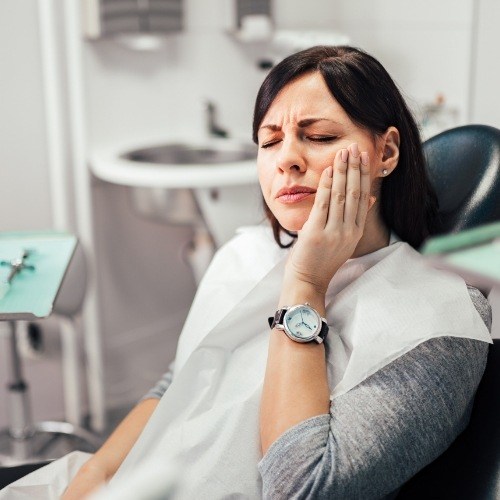
Our biggest concern during a dental emergency is to stop your pain and protect your oral health. With that said, we will let you know how much you can expect to pay for any given treatment, and we’ll make sure that you understand exactly why certain services are being recommended for your smile. If you are interested in learning more about the cost in the meantime, then read on – this next section is for you!
Every Dental Emergency is Different – Here’s Why
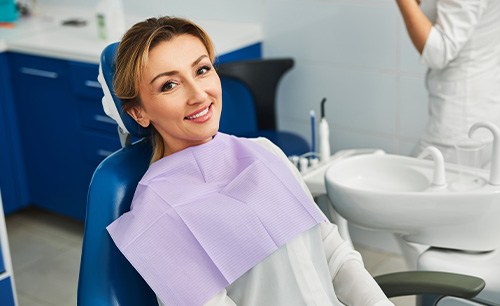
The short answer is “no two situations are exactly the same!” In fact, even two patients who are visiting us for the same reason may need two different treatments to restore their healthy, pain-free smile. While this does mean we cannot provide you with an accurate estimate of the price online, we’re more than happy to share the cost with you following the exam. Then, we will find ways to fit the cost of emergency care into your budget, such as maximizing your insurance benefits.
Does Dental Insurance Cover Dental Emergencies?

Many patients wonder if their dental insurance provider will cover a portion of the cost of emergency dentistry in Columbia. Oftentimes, the answer is “yes.” In addition to covering 100% of the cost of preventive care, many providers cover between 50% and 80% of the cost of essential restorative care as well as the cost of the emergency exam. So, if you are insured, it’s worth taking the time to familiarize yourself with your benefits. If you need any help, don’t hesitate to call the helpline on your plan or let us know!
Other Options for Making Dental Emergencies Affordable
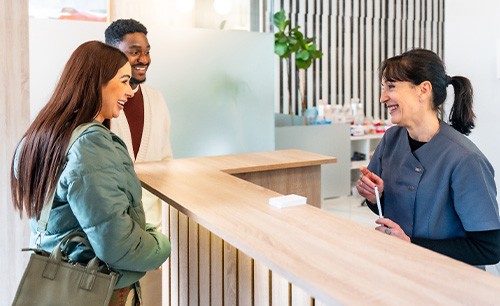
If you are currently uninsured, ask us about:
- Flexible Financing – Would paying for the entire cost of your care put a strain on your wallet? If so, Cherry and CareCredit can help! Their payment plans allow you to space out the cost of your care into smaller, more manageable chunks.
- Our Columbia Healthy Smiles Membership Program – Joining our in-house plan comes with several perks, including discounts on services completed at our office. If you’d like more details or to learn where to sign up, simply ask a friendly member of our team!
How Taking Care Of Your Smile Can Save You Money

Remember, many dental injuries, including cracked and knocked out teeth, are largely preventable. The key is incorporating good habits into your routine and breaking bad ones. For example, brushing, flossing, and rinsing with mouthwash consistently will help prevent painful cavities. Smoking, on the other hand, wreaks havoc on your teeth and gums, increasing your risk of dental trouble in the process.
Important reminder: Common oral health problems, like tooth decay and gum disease, only get worse with time. That’s why it’s so important to schedule a dental exam every six months (or sooner if you start to experience abnormal symptoms).
Keys to Preventing Dental Emergencies
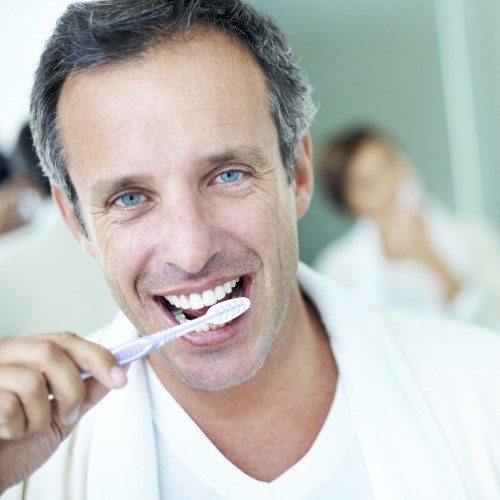
Dental emergencies tend to worsen the longer they remain untreated, which can result in more costly, complex procedures to repair your smile. Although you can never fully anticipate when you might have an unexpected problem, there are several things you can do to help avoid one!
Practicing proper preventive care helps strengthen your teeth and gums, reducing the risk of common concerns like cavities, gum disease, and injuries that can lead to urgent issues. Continue reading to learn more about proactive ways to care for your grin that can help you steer clear of dental emergencies!
Schedule Routine Dental Visits
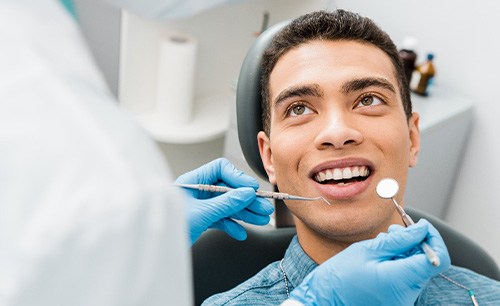
Did you know you can save your smile and your budget by scheduling a checkup and cleaning with our team every six months? Routine appointments allow us to examine your mouth, screen your tissues for signs of oral cancer, and take X-rays to ensure nothing has developed beneath the surface.
This also gives our team the opportunity to identify and treat potential areas of concern, such as swollen gums or thinning enamel, before they become truly problematic.
Implement an At-Home Hygiene Routine
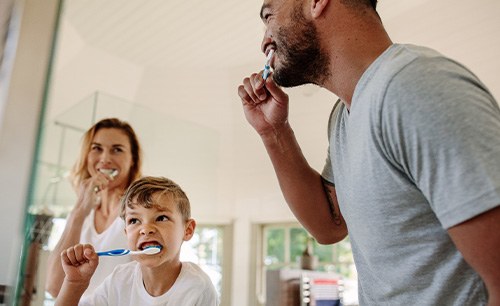
It’s also essential to clean your mouth consistently at home to regularly remove plaque and bacteria buildup that cause cavities, periodontal concerns, and other issues. Brushing and flossing twice daily is a simple and effective way to clear harmful residue that can damage your dental health.
You can also rinse your mouth with a non-alcoholic, anti-bacterial rinse to eradicate unwanted germs and freshen your breath!
Enjoy Nutritious Foods

Consuming copious amounts of sugar attracts bacteria that produce acids that wear down your enamel, leading to tooth decay, injuries, and other problems. Not only that, but eating overly hard or crunchy foods can potentially chip and crack this protective outer layer.
Fortunately, making more conscientious dietary decisions can help you preserve your dental health. For example, dairy products like cheese, yogurt, and milk contain calcium for strong teeth and bones, and many citrus fruits and leafy greens are high in vitamin C to support your connective tissues.
Protect Your Smile
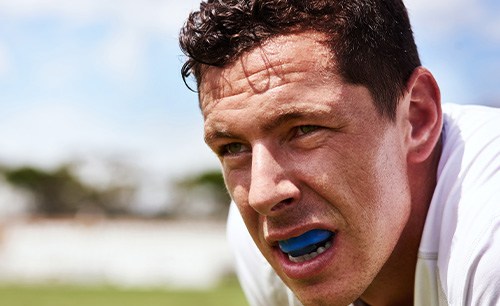
Athletes and others who participate in team sports or other high-contact activities are prone to sustaining injuries, like a blow to the face, that can break or dislodge a tooth. Furthermore, patients who subconsciously grind their teeth might wear down their enamel unevenly or prematurely, increasing the risk of cavities and other damage.
Our team can provide a custom-fitted mouthguard or nightguard to cushion your teeth and evenly distribute the force of grinding or physical trauma to safeguard your smile.
Avoid Using Your Teeth as Tools

You’re not alone if you’ve ever used your teeth to tear open a piece of mail or plastic packaging, but they’re not intended to be used this capacity. Enamel may be the hardest substance produced by the human body, but it’s not invincible. You might chip, crack, or break your teeth if you use them as tools.
You can help avoid injuries by taking a few moments to locate the appropriate instrument for the job at hand, such as a letter opener, box cutter, or pair of scissors.
Caring for Your Smile at Home

When you call our dental office for dental care, we’ll walk you through first aid and pain management steps over the phone. However, some basics to keep in mind during a dental emergency include:
- Use cool water to gently rinse out the mouth or clean off knocked-out teeth or parts of teeth. Do not scrub or brush damaged tissue or use oral hygiene products unless directly instructed to do so.
- Use floss to remove objects stuck between teeth. Do not use sharp or pointed items as this may damage soft tissue.
- Take over-the-counter pain relievers as directed for discomfort or sensitivity, but do not place an aspirin directly onto the tooth.
- Apply pressure with a gauze or clean cloth to slow bleeding.
- Use an ice pack or cold compress to slow bleeding, reduce swelling, and relieve pain.
- Replace a knocked-out tooth or dental restoration in the socket it came from whenever possible. If you’re unable to replace the tooth or restoration, store it in a container of milk until you reach the dental office.
Dental Emergency FAQs
Will my toothache go away on its own?
The reason we don’t recommend taking the “wait and see” approach is because, the more time that passes, the worse the root of the problem will get. In other words, your tooth isn’t able to heal from decay or infection without the necessary restorative care. So, whether you’ve been dealing with a toothache for a day, a month, or over a year now, the best thing to do is schedule an appointment with our Columbia emergency dentist.
How should I sleep with tooth pain?
If you’re out-of-town, or your symptoms surfaced a few hours after going to bed, a same-day visit may not be possible. If you find yourself in this situation, then it’s important to know a few measures you can take to alleviate your pain in the short-term, like taking OTC pain medication (following the directions on the label) and propping up a few pillows so your head stays elevated throughout the night. You can also use a cold compress for 10 minutes at a time to help alleviate pain, swelling, and inflammation.
Should I visit the emergency room first for dental emergencies?
You should only go to the ER if your dental injury is accompanied by potentially life-threatening symptoms, like difficulty breathing or uncontrollable bleeding. Remember, hospitals don’t typically have dentists on-staff. So, if you go there with a toothache, the most they will be able to do is alleviate your pain and send you to your dentist.
What does throbbing tooth pain mean?
Throbbing tooth pain is never good news. That’s why contacting us ASAP to schedule an emergency exam is so important! Once Dr. Batson or Dr. Abe has the opportunity to learn more about your symptoms, review your X-rays, and take a look at the tooth in question, they can determine if a crack in your enamel, a cavity, or an infection is the root of the problem.
Do I need to visit for minor chips to teeth?
You might think the answer is “no,” especially if you aren’t in pain. However, your tooth cannot regenerate on its own. Plus, even if it doesn’t hurt, it’s possible for an infection to develop or for the tooth to break further. For those reasons, we recommend scheduling an appointment with us before the end of the week.
Can superglue be used to repair broken dentures?
Superglue may be an effective adhesive, but it contains toxins that are not safe to ingest. So, don’t use this (or any other) household product to attempt to repair your denture. Instead, give us a call, share what happened, and schedule an appointment to have your restoration repaired or replaced by a dental professional.
What does chronic bad breath mean?
If you’re having trouble keeping your breath minty-fresh, then start by taking a look at your diet. If it’s filled with pickled onions, garlic, fish, and other pungent foods, then make some adjustments to your meals and see if that helps. If the odor persists, then an untreated oral health problem may be to blame. Come in for a visit so we can learn more about your concerns, conduct an oral exam, and share our recommendations on how to move forward – whether that’s switching your at-home oral hygiene products or addressing tooth decay.
